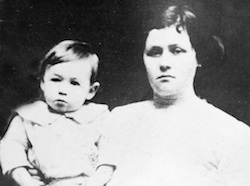By Marshall Weiss , other
When Titanic departed on its first and last voyage from Southampton, England on Wednesday, April 10, 1912, 18-year-old Jewish immigrant Leah Aks and her 10-month-old son, Philip were on board.
Passover had concluded the day before. On sailing day, Leah was pleased to find that the third class was not completely booked; she and Philip had a cabin all to themselves.
Leah was born in Warsaw, Poland. In London, she had met Sam Aks, a tailor who was also from Warsaw. They were married there.
“In London he was barely making a living,” wrote Valery Bazarov, historian for the Hebrew Immigrant Aid Society, in a piece about the family for HIAS. “A cousin who lived in America visited him in London and told him that if he came to America he’d make money very quickly. So he came over, got a job, and soon saved enough money to bring Mrs. Aks and the baby over.”
Sam settled in Norfolk, Va. and entered the scrap metal business. In “Titanic: Women and Children First,” author Judith B. Geller indicates that all the money Sam earned was used for Leah and “Filly’s” trip to join him. Their arrival in Norfolk would mark the first time Sam would meet his son.
Though Leah and Filly were booked onto an earlier ship, Bazarov explained that Leah’s mother convinced her to wait a week and travel on Titanic, considered the world’s safest liner.
Four days into their journey, after the ship struck an iceberg, Leah and Filly followed other third-class passengers to the bottom of the third-class staircase at the rear of the ship.
At 12:30 p.m., the crew permitted women and children in this group to make their way to the boat deck. When crew members saw that Leah and Filly couldn’t get through the crowd up the stairs, they carried the two. Leah and Filly made it to the boat deck, part of the first-class area of the ship. Madeline Astor, the young wife of millionaire John Jacob Astor, covered Filly’s head with her silk scarf.
According to Bazarov, a distraught man — who had been rebuffed by the crew when he attempted to get into a lifeboat — ran up to Leah and said, “I’ll show you women and children first!”
The man grabbed Filly and threw him overboard.
Leah searched the deck until someone urged or pushed her into lifeboat 13. She sat in the middle of the Atlantic with 63 others in number 13, a broken woman. Hours after Titanic went down and the cries for help from those dying in the water faded away, the liner Carpathia arrived at daybreak.
Leah searched the deck of Carpathia in vain for her baby. Despondent, she took to a mattress for two days. Titanic survivor Selena Cook urged Leah to come up on deck for air. When she did, she heard Filly’s cry.
Unknown to Leah, Filly had fallen into lifeboat number 11, right into another woman’s arms. In Geller’s account, the woman is presumed to have been Italian immigrant Argene del Carlo. Her husband was not permitted to follow the pregnant Argene into the lifeboat.
“Argene shared her warmth with Filly through the long night,” Geller writes. “Toward morning she began to believe that God had sent this child to her as a replacement for Sebastino (her husband) and a brother for the child she carried in her womb.”
On the deck of Carpathia, the woman who had cared for Filly since Titanic sank refused to give Leah the child.
Leah appealed to the Carpathia’s captain, Arthur Roston, now put in the role of King Solomon.
In an e-mail interview with The Observer, Gilbert Binder, the husband of Leah’s late granddaughter, Rebecca, described what happened next.
Binder said that Filly was returned to Leah because “she identified him as a Jewish baby and he was circumcised. The (other) woman was Catholic and Italian and her male child would not have been circumcised.”
After their arrival in New York, Leah and Filly were taken to HIAS’ shelter and remained there until Frank could come for them.
“Leah Aks gave birth to a baby girl nine months after arriving in this country and intended to name her Sara Carpathia,” in honor of the rescue ship, Binder explained. “The nuns at the hospital in Norfolk, Va. got confused and named the baby Sara Titanic Aks. I have a copy of her birth certificate.” Sara was Binder’s mother-in-law.
Leah lived until 1967; her son, Filly, until 1991.
Marshall Weiss is the editor and publisher of The Dayton Jewish Observer.
